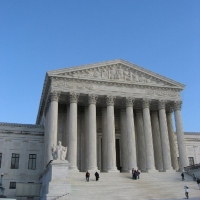In April 2024, the Supreme Court of the United States (SCOTUS) handed landowners positive news regarding their property rights. The first, Devillier v. Texas, allows Texas landowners to proceed in Federal Court their constitutional Fifth Amendment “takings” claims against the Texas Department of Transportation (TxDOT) for flooding their properties without “adequate compensation.” SCOTUS unanimously ruled that the Texas landowners may procedurally proceed against TxDOT because Texas state law provides an inverse-condemnation cause of action, and it provides the vehicle for their Fifth Amendment claims.
Unfortunately, the ruling does not uniformly apply to all 50 states because SCOTUS did not decide the question as to whether the Fifth Amendment is self-executing if no such enabling state law exists. For further analysis and to read the opinion, please see the articles below.
The second, Sheetz v. County of El Dorado, California, SCOTUS unanimously ruled the governments cannot us their permitting process to coerce or extract exorbitant development fees from landowners. Specifically, fees known as “legislative extractions” must be closely related and proportional to any adverse public impacts caused by the landowner’s development. In this case, the county required Mr. Sheetz to pay a traffic impact fee of $23,000 in exchange for his permit to build his modest manufactured home in a rural area. The county did not have the funds for future road improvements, so it legislated the impact fees regardless of the impact his manufactured home had to traffic increases. For further reading, please see below the attached article from the Pacific Legal Foundation who represented Mr. Sheetz.
-Patrick L. Reznik, Attorney and Counselor

US Supreme Court Allows Texas Landowners Takings Claims to go Forward on Amended Complaint
Blog by Tiffany Lashmet for the Texas Agriculture Law Blog
The United States Supreme Court issued a unanimous decision in Devillier v. Texas, allowing Texas landowners’ takings claims to proceed against the State of Texas under an amended complaint. Read More
Supreme Court Says Texas Rancher Can Sue Over Flooding
Article by Andrew Wimer for the Institute for Justice
WASHINGTON—This morning, a unanimous Supreme Court ruled that a Texas rancher and his neighbors may continue to seek compensation from the state of Texas after a highway project flooded out their property. Richie DeVillier, a third-generation rancher whose land was turned into a lake after Texas officials built a dam along the median of the highway just south of it, is represented by the Institute for Justice (IJ), a nonprofit public interest law firm that defends property rights nationwide. Read More
 The government had George Sheetz ‘over a barrel.’ He took his case to the Supreme Court – and won.
The government had George Sheetz ‘over a barrel.’ He took his case to the Supreme Court – and won.
Article by Nicole W.C. Yeatman for the Pacific Legal Foundation
Picture this: You’re a 65-year-old retiree who bought a small parcel of land in El Dorado County, California. In your career you worked you way up from $5-an-hour laborer to head of your own engineering contracting company. Read More



